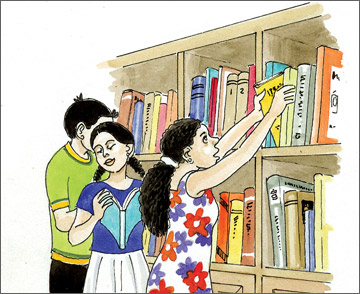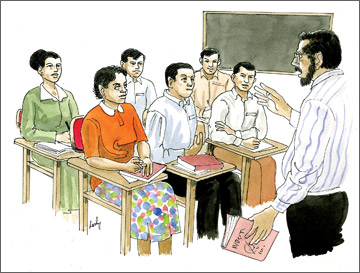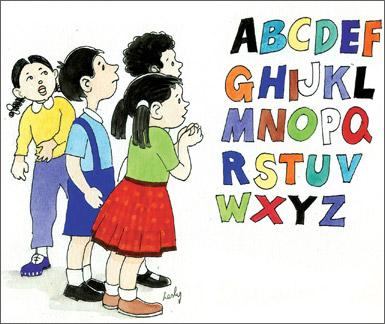|
Teaching English as a second language:
Eyes on the future
Aditha Dissanayake
Once upon a time not so long ago an English trained teacher was asked
by an In Service Adviser (the modern version of the School Inspector) if
he had read Romeo and Juliet. He answered with confidence. “I have read
Romeo but not Juliet”. Funny? Yes, but not as something to laugh at.
Funny in the other sense of the word; funny as in “something is wrong”.
 Wrong
in the English education system? Or in our attitudes, our perceptions,
our culture when it comes to teaching English as a second language? The
answer, (with confidence), is yes, to both questions. Wrong
in the English education system? Or in our attitudes, our perceptions,
our culture when it comes to teaching English as a second language? The
answer, (with confidence), is yes, to both questions.
The fact that after eleven years of learning English 62 percent of
the candidates who sit for the English Language paper at the G.C.E
O-Level examination fail to obtain the passing mark, is evidence the
present day English education system needs radical changes. Judging from
the answer given by the English teacher in the dialogue above, the main
reason for this tragic situation is surely the lack of efficient
teachers; teachers who are thorough in their knowledge of English;
teachers who know how to impart their knowledge to the students and
teachers who take their profession seriously.
If we are to look beyond our shores for guidance in solving this
problem, (to countries like Finland, South Korea and Denmark), we are
bound to pick up one main point: they insist that their teachers come
from the top one-third of their college graduating classes. As author
Tony Wagner says in his book The Global Achievement Gap, “They took
teaching from an assembly-line job to a knowledge-worker’s job. They
have invested massively in how they recruit, train and support teachers,
to attract and retain the best.” In South Korea, for example teachers
are seen as ‘nation builders’, and those who enter the profession are
almost always from the top third of their batches at university.
The governments of these countries believe excellence has to be
rewarded and that teachers should not be treated as “interchangeable
widgets”. They believe throwing a kid in a class and a teacher into it
is not the way to run the education system of a country. In order to
attract the best, these countries have created the kind of environment
and incentives that make people want to come into the profession.

This is exactly what we lack, here in Sri Lanka. Those who are
proficient in English find more lucrative jobs elsewhere. P. Ganeshan,
In Service Adviser from Kilinochchi agrees. The worst problem when it
comes to teaching English as a second language in Kilinochchi is the
lack of teachers. There are only a few English trained teachers in the
ninety schools in the region and a handful of part time teachers. The
latter do not stay in the profession for long if they fail to get
themselves registered as paid teachers.
Quantity apart the quality of teaching too is a major problem. “Let
us say some teachers are not up to the standard” says an experienced
teacher trainer from the Gampaha district, trying to find the right
words to make his statement as mild and delicate as possible.
The main reason for this is the low cut off marks allocated to the so
called underprivileged areas like Mahiyanganaya when it comes to
recruiting teachers for the colleges of education.
“How can people who obtain around 13 marks out of hundred and enter
the Colleges of Education teach English to others,” he asks and adds
that the situation gets worse because most teachers and school
principals do not
 believe
in the importance of seminars and workshops which are held to train
teachers once they enter the profession. From the students’ angle he
observes most students do not see the necessity to study English as they
can get through their day to day needs using only their mother tongue. believe
in the importance of seminars and workshops which are held to train
teachers once they enter the profession. From the students’ angle he
observes most students do not see the necessity to study English as they
can get through their day to day needs using only their mother tongue.
The situation is no different among undergraduates. According to a
former instructor at the English Language Teaching Unit of the
University of Colombo, most of the students in her class were more
interested in getting the certificate than in learning what was taught.
“They sat through the classes very patiently” she recalls. “They told me
they knew all the grammar but make mistakes in spite of this. Often they
were puzzled as to why their English never improved even though they
were taught English from their school days”.
Could this be due to want of trying? After all when you browse the
shelves of any popular bookshop you are bound to come across shelf upon
shelf crammed with Sinhala translations of English fiction and
non-fiction.
A child who likes Harry Potter need not sweat over J.K Rowling’s
English when he can easily read it in Sinhala. The same is evident on TV
where English programs are often dubbed in Sinhala. Why break your neck
to learn English when you can watch Robin Hood speaking in Sinhala?
Which leads to the simple fact that if we want better teachers we
also need better parents ? parents who turn off the TV, parents who
encourage reading, parents whose one aim is not to see their offspring
get through the major subjects, feeling English could easily be learned
after they pass their Advanced Level exams.
In other words, the more we demand from teachers the more we have to
demand from ourselves. This is the only contract that will truly ensure
we are heading somewhere when it comes to teaching English as a second
language in Sri Lanka. All eyes to the future.
[email protected]
A complex problem
Well-known teacher
trainer Dinali Fernando explains the reasons behind the low percentage
of passes obtained for English at G C E Ordinary Level Examination
“You can’t really pin this on one particular reason. There are
several. One main cause is the dearth of English teachers in rural
areas, particularly in the north and east. Teachers are unequally
distributed — good, magnet schools have more than enough teachers at
times, whereas some rural schools have not had a teacher for 10-20
years.
Another problem is the quality of teaching. There are many teachers
who have had too little training to be able to teach effectively, i.e
develop a child’s language skills. Many teachers are ‘manacled’ to the
text book, and get students to do it by rote, without really addressing
what the child needs. At times, teachers are under pressure to complete
the textbook at whatever cost by principals, parents and In-service
Advisers.
Another is the curriculum. Many an experienced teacher says that it
is too vast — we’re simply trying to teach too much and not achieving
much as a result.
Tied to this, another issue being reported more and more by teachers
and trainers is that the textbooks are far too difficult for the vast
majority of students in the country. In comparison, the O-L paper
requires a much lower level of English, but still, going by the results
even this is too difficult for most students. And it’s true that there
are five periods a week to learn English, but a crowded classroom of
40-50, even with the best of teachers, is just not an effective language
learning environment.
Many people from many different quarters continue to address this
complex problem but this is a massive undertaking.
Learning a language is in itself a complex process that cannot really
be restricted to the classroom. Globally, approaches to teaching English
as a second language have undergone several changes.
They have had an impact on our curriculum as well, with one method
being overthrown for another, which means designing new syllabi, writing
new textbooks and retraining teachers. And with the politicization of
teacher transfers and unequal access to training, the problem gets more
complicated.” |



